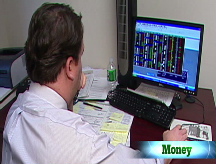Stocks stage a comeback
The Dow bounces after touching a 3-month low, amid worries about the stimulus and bank bailout plans.

NEW YORK (CNNMoney.com) -- Stocks erased losses Thursday, with the Nasdaq managing gains following reports that the Obama administration is putting together a plan to subsidize mortgages for troubled homeowners.
The Dow Jones industrial average (INDU) lost 6 points, or 0.1%, closing below 8,000 for the third straight session. The Dow had lost as much as 245 points in the afternoon, hitting its lowest level since Nov. 21 - considered by many pros to be the low of the bear market.
The Standard & Poor's 500 (SPX) index added 1 point, or 0.2%. The Nasdaq composite (COMP) gained 11 points, or 0.7%.
Questions about the bank bailout plan and economic stimulus bill dragged on stocks throughout the session. The selling gained steam after the release of a bleak report on home prices.
But stocks erased losses and the Nasdaq turned higher after reports surfaced that the Obama administration is working on a plan to modify home loans, a move that could help stabilize the flailing industry.
Still, concerns remain in place, and the stock turnaround was as much about bouncing off the multi-year levels as any policy talk.
In general, "there's just malaise and skepticism about what really needs to happen to get us out of the mess," said Paul Brigandi, vice president of trading at Direxion Funds.
He said that at some point Wall Street will have fully accounted for all the negativity and will begin to make a more sustained move higher. But at this point, the gains are just short-term rallies in a bear market.
Stocks rose Wednesday, finding momentum at the end of a choppy session, after lawmakers announced that the Senate and House had reached a compromise deal on a $789 billion economic stimulus package.
The bill is expected to be voted on by the two houses on Friday, meeting President Obama's goal of having it on his desk to sign by Monday, Presidents Day.
Enthusiasm about the bank bailout plan and the stimulus plan lifted stocks last week. But it dissipated this week.
"There was all this anticipation about the Geithner plan, and then they release this amorphous mess," said Greg Church, president of Church Capital.
He said the economic stimulus plan wasn't doing much for market psychology at the moment because a lot of its impact on the economy won't be felt until next year.
Overall, the market is reflecting "the realization that we still have a big problem and we are still not sure how to deal with it," he said.
Friday's economic report of note is the University of Michigan's February consumer sentiment index. The index is expected to have weakened to 60.2 from 61.5 in the previous month, according to a consensus of economists surveyed by Briefing.com.
Economy: Thursday morning, the National Association of Realtors said that home prices fell 12.4% in the fourth quarter of last year. The decline left prices at the lowest level since 2003.
Another report showed that unemployment claims fell last week, but remained near a 26-year high. The government reported that the number of Americans filing new claims for unemployment fell by 8,000 last week to a seasonally adjusted 623,000.
The Commerce Department released its January retail sales report Thursday morning. Sales rose 1% after falling for six straight months, fueling skepticism from economists. Economists thought sales would fall 0.8% in the month, according to a Briefing.com survey.
Sales excluding volatile autos rose 0.9% versus forecasts for a drop of 0.4%.
Bank bailout: Investors continued to react to the Obama administration's bank bailout plan announced earlier in the week, which was seen by critics as lacking details.
On Wednesday, Geithner testified before the Senate Budget Committee, but was vague on details. Also Wednesday, executives at eight of the largest financial institutions testified before a House committee regarding how they are using the bailout money they've already been given.
Big bank shares cut losses, but remained in the red Thursday, despite the broad market turnaround.
The KBW Bank Sector (BKX) index fell 2.8%.
General Electric (GE, Fortune 500) shares continued to trade in tune with the financial sector, as investors focused on the prospects for its GE Capital unit.
Other movers: A bright spot was Dow component Coca-Cola (KO, Fortune 500), which rallied after it reported a better-than-expected quarterly profit, thanks to strong global sales. Shares rose 7.6%.
Select technology shares gained, lifting the Nasdaq, including Qualcomm (QCOM, Fortune 500), Dell (DELL, Fortune 500) and Apple (AAPL, Fortune 500).
Market breadth was mixed. On the New York Stock Exchange, decliners beat advancers eight to seven on volume of 1.48 billion shares. On the Nasdaq, winners narrowly topped losers on volume of 2.48 billion shares.
Bonds: Treasury prices inched higher lowering the yield on the benchmark 10-year note to 2.78% from 2.79% Wednesday. Treasury prices and yields move in opposite directions.
Lending rates were unchanged. The 3-month Libor rate held steady at 1.23%, according to Bloomberg.com. The overnight Libor rate held steady at 0.30%. Libor is a bank lending rate.
Other markets: In global trading, Asian and European markets both ended lower.
The dollar gained against the euro and the yen.
U.S. light crude oil for March delivery fell $1.96 to settle at $33.98 a barrel on the New York Mercantile Exchange.
COMEX gold for April delivery rose $4.70 to $949.20 an ounce.
Gasoline prices rose 1.2 cents to a national average of $1.952 a gallon, according to a survey of credit-card swipes released Thursday by motorist group AAA. ![]()



